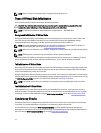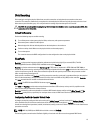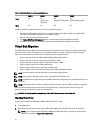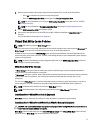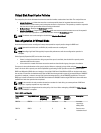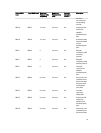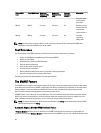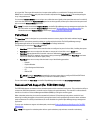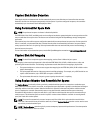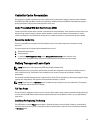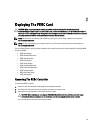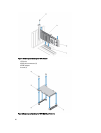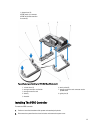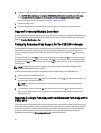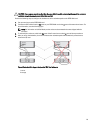
Physical Disk Failure Detection
Failed physical disks are detected and rebuilds automatically start to new disks that are inserted into the same slot.
Automatic rebuilds can also happen transparently with hot spares. If you have configured hot spares, the controllers
automatically try to use them to rebuild failed physical disks.
Using Persistent Hot Spare Slots
NOTE: The persistent hot spare slot feature is disabled by default.
The PERC H310, H710, H710P, and H810 cards can be configured so that the system backplane or storage enclosure disk
slots are dedicated as hot spare slots. This feature can be enabled using the Dell OpenManage storage management
application.
Once enabled, any slots with hot spares configured automatically become persistent hot spare slots. If a hot spare disk
fails or is removed, a replacement disk that is inserted into the same slot automatically becomes a hot spare with the
same properties as the one it is replacing. If the replacement disk does not match the disk protocol and technology, it
does not become a hot spare.
For more information on persistent hot spares, see the Dell OpenManage documentation at dell.com/support/manuals.
Physical Disk Hot Swapping
NOTE: To check if the backplane supports hot swapping, see the
Owner’s Manual
of your system.
Hot swapping is the manual replacement of a disk while the PERC H310, H710, H710P, or H810 cards are online and
performing their normal functions. The following requirements must be met before hot swapping a physical disk:
• The system backplane or enclosure must support hot swapping for the PERC H310, H710, H710P or H810 cards to
support hot swapping.
• The replacement disk must be of the same protocol and disk technology. For example, only a SAS hard drive can
replace a SAS hard drive; only a SATA SSD can replace a SATA SSD.
• The replacement disk must be of equal or greater capacity than the one it is replacing.
Using Replace Member And Revertible Hot Spares
The Replace Member functionality allows a previously commissioned hot spare to be reverted to a usable hot spare.
When a disk failure occurs within a virtual disk, an assigned hot spare (dedicated or global) is commissioned and begins
rebuilding until the virtual disk is optimal. After the failed disk is replaced (in the same slot) and the rebuild to the hot
spare is complete, the controller automatically starts to copy data from the commissioned hot spare to the newly-
inserted disk. After the data is copied, the new disk is a part of the virtual disk and the hot spare is reverted to being a
ready hot spare. This allows hot spares to remain in specific enclosure slots. While the controller is reverting the hot
spare, the virtual disk remains optimal.
NOTE: The controller automatically reverts a hot spare only if the failed disk is replaced with a new disk in the
same slot. If the new disk is not placed in the same slot, a manual Replace Member operation can be used to revert
a previously commissioned hot spare.
NOTE: A Replace Member operation typically causes a temporary impact to disk performance. Once the operation
completes, performance returns to normal.
22



